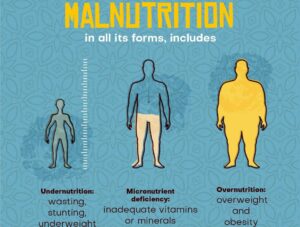Back to: Pre Vocational Studies Primary 4
Welcome to class!
In today’s class, we shall be talking about deficiency and malnutrition. I trust you will enjoy the class!
Deficiency and Malnutrition
Deficiency and malnutrition are serious health issues that can arise when the body lacks essential nutrients. These conditions can lead to a variety of health problems, including stunted growth, weakened immune systems, and cognitive impairment.
What is Deficiency?

Deficiency occurs when the body lacks a specific nutrient, such as a vitamin or mineral. Common nutrient deficiencies include:
- Iron deficiency: Can cause anemia, leading to fatigue, weakness, and difficulty concentrating.
- Vitamin D deficiency: Can weaken bones and increase the risk of fractures.
- Vitamin B12 deficiency: Can cause nerve damage and anemia.
- Iodine deficiency: Can impair cognitive function and thyroid health.
- Zinc deficiency: Can affect growth, immune function, and wound healing.
What is Malnutrition?

Malnutrition is a broader term that encompasses both undernutrition and overnutrition.
- Undernutrition: Occurs when the body does not receive enough energy or nutrients. It can lead to stunted growth, wasting, and weakened immunity.
- Overnutrition: Occurs when the body consumes too many calories or specific nutrients. It can lead to obesity, heart disease, and type 2 diabetes.
Causes of Deficiency and Malnutrition
Several factors can contribute to deficiency and malnutrition:
- Poor Diet: A diet lacking in fruits, vegetables, and whole grains can lead to nutrient deficiencies.
- Poverty: Poverty can limit access to nutritious food.
- Illness: Certain illnesses can interfere with nutrient absorption.
- Genetic Factors: Some individuals may be more susceptible to nutrient deficiencies due to genetic factors.
Preventing Deficiency and Malnutrition

To prevent deficiency and malnutrition, it is important to:
- Eat a Balanced Diet: Consume a variety of fruits, vegetables, whole grains, lean proteins, and healthy fats.
- Limit Processed Foods:2 Reduce your intake of processed foods, which are often high in unhealthy fats, sugar, and sodium.
- Cook at Home: Preparing meals at home allows you to control the ingredients and portion sizes.
- Stay Hydrated: Drink plenty of water throughout the day.
- Seek Medical Advice: Consult with a healthcare professional to identify and address any nutrient deficiencies.
Conclusion
By understanding the causes and consequences of deficiency and malnutrition, we can take steps to prevent these serious health issues. A balanced diet, regular physical activity, and adequate rest are essential for optimal health and well-being.
Evaluation
- What is the difference between undernutrition and overnutrition?
- Name three nutrients that are commonly deficient in people’s diets.
- How can poverty contribute to malnutrition?
- What are some tips for eating a balanced diet?
- Why is it important to stay hydrated?
Great job! We have come to the end of today’s class. I hope you enjoyed the class!
In the next class, we shall be discussing digging tools.
In case you require further assistance or have any questions, feel free to ask in the comment section below, and trust us to respond as soon as possible. See you in the next class!
